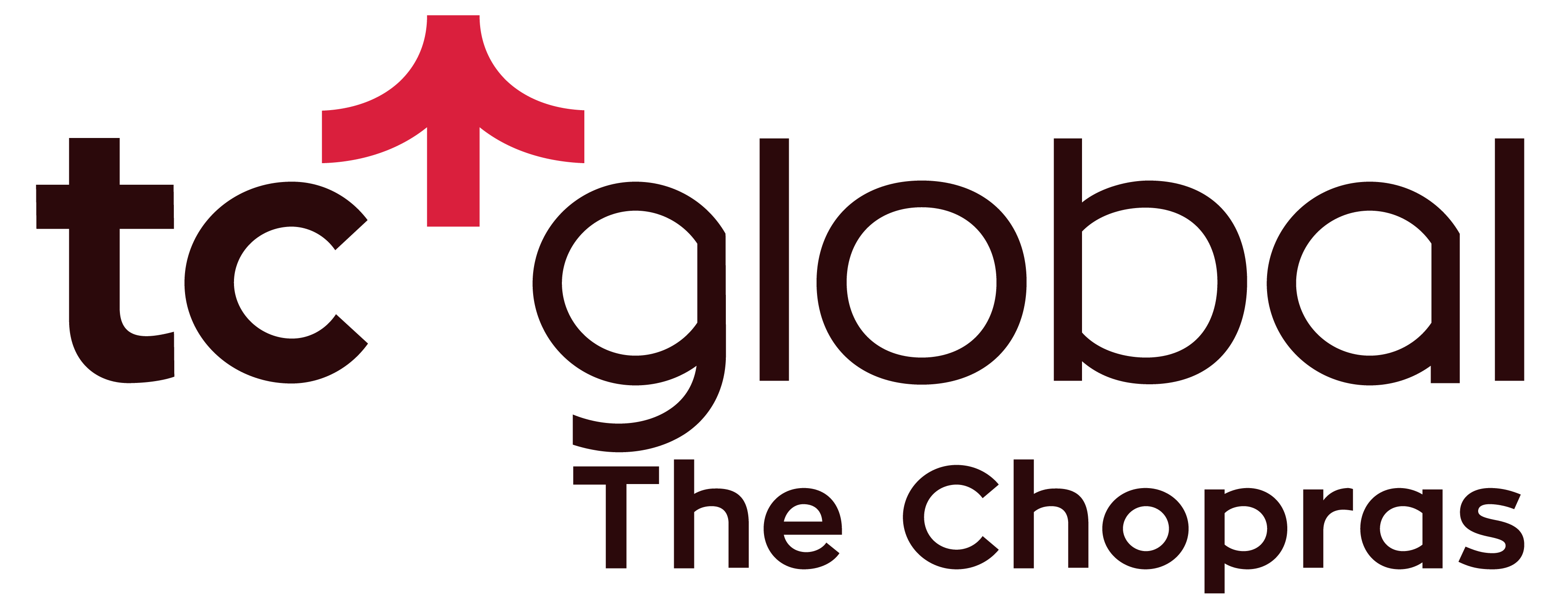Be it the Beatles, football or sea trade, Liverpool has a significant place in the socio-cultural history of the United Kingdom. This article looks at another aspect of this metropolitan borough – at the Universities in Liverpool. When considering studying in the UK, it is important to look beyond London or Oxbridge.
We look at the top universities in Liverpool that offer accessible and affordable higher education options to international students.
Why should one look at Liverpool (unless you are a Liverpool F.C. fanatic, of course) when you have places like London, Oxford, Cambridge or Bristol? Here are the benefits to study in Liverpool from India.
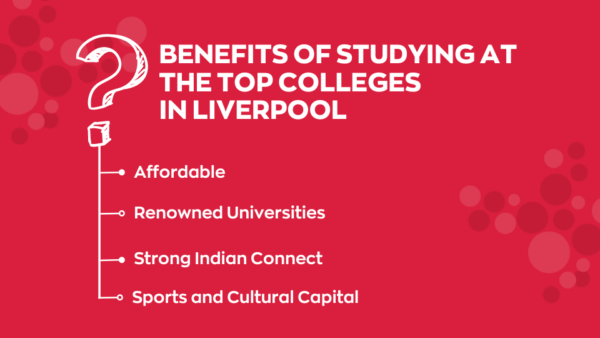
- Affordable. You can find accommodation ranging from £400 to £800 per month. Public transport costs less than £100 monthly. Even its nightlife is said to be student-centric. Student life is easier, accessible and affordable.When compared to London which is one of the most expensive cities in the world to live in, Liverpool is one of the cheapest cities in the UK.
- Home to some of the more renowned universities. While they may not be in the top 10 in the world, the institutions are some of the best universities in Liverpool especially for Indian students. These universities are accessible to students from different educational backgrounds and more affordable when compared to those in London. They are also recognised worldwide for certain specialisations. For instance, the Liverpool John Moores University is renowned for its physical education and sports science programmes.
- Liverpool also has a strong Indian connect: According to the 2021 Census data, about 1.29% of the population of Liverpool is either Indian or Indian-British. It also means that there are Indian student communities in Liverpool universities. For instance, Liverpool Hope University also has partnerships with institutions in India, allowing students to study in Liverpool from India. Indian faculty at Liverpool universities have carved a niche for themselves. For instance, Professor Har Gobind Khorana, who completed his PhD in the university of Liverpool went on to become a Nobel Laureate in the field of Physiology and Medicine.
- Sports and cultural capital. Be it Everyman & Playhouse, The Walker Art Gallery or Tate, art and culture is ingrained in almost every aspect of the city. It has a vibrant music scene (it is home to the Beatles after all!) and a rich history. Liverpool F.C. and Everton football clubs have fans all over the world.

Three of the top UK universities and a few dedicated institutes of higher education are located in Liverpool. The campus life is vibrant, with a balanced mix of academic and extracurricular activities.
- Liverpool libraries are stunning repositories of both tradition and modernity. The universities and the city place emphasis on their libraries and invest in them regularly to keep it upgraded for the student population.
- Student societies and associations are another integral part of campus life. Be it robotics, theatre or Indian cultural societies at Liverpool universities, you will always have the option of finding the right group of people for you.
- Student support systems are another integral part of campus life. It includes academic counselling, university placements for Indian students or mental health support when required.
- Campus spaces are extensive lush spaces and parks wherein you can either stroll or find the perfect tree to study under.In addition to the greenery, Liverpool is also a very walkable city. While the city has a well-connected public transport system, you will be able to cover most of your regular spots on foot.
| Indian Student’s Experience in Liverpool University
Charanian Udayabhaskar Reddy, India, LLB Bachelor of Laws“My decision to study Law at Liverpool is one of the best choices I have made about anything to date. Law at the Liverpool Law school is fun, intense and informative.”
Source: liverpool.ac.uk |
Cost of Living in Liverpool
While discussing campus life, let us also talk about the possible expenditure. The following list shows median monthly expenditure. These amounts can vary to a large extent, depending on lifestyle choices. The tuition fees of each of the universities are discussed in the following sections.
- Accommodation: £500 – £800
- Travel (bus/trains/taxis): £0 – £80
- Food: £50 – £400
- Mobile phone: £5 – £30
- Leisure/entertainment: £30 – £200
- Study costs (books, photocopying): £10 – £20
- Laundry: £0 – £20
- Household bills: £0 – £80
- Gym membership: £15 – £30

As a student applying from India, it is also important to look into scholarship options. Four sources should always be considered when looking into financial aid:
- Indian government scholarships for students going to UK
- UK government scholarships for students from India
- University scholarships
- Scholarships from external sources such as charitable trusts and philanthropic organisations.
Here are some of the UK Government Scholarships for international students:
- Chevening Scholarships
- Commonwealth Masters Scholarships
- Commonwealth Fellowship Plan
- Global Study Awards
- GREAT Scholarships India
- British Council Scholarships for women in STEM
- Charles Wallace India Trust Scholarships
Liverpool University Scholarships for Indian Students
- University of Liverpool
- Duncan Norman Research Scholarship
- Sport Liverpool Scholarship
- Vice-Chancellor International Awards
- University of Liverpool International College Excellence Award
- Liverpool John Moores University
- LJMU International Achievement Scholarship at the postgraduate and undergraduate levels
- Liverpool Hope University
- International Excellence Bursary
- International Regional Scholarship
- Early Payment Discount
- International Postgraduate Scholarship
Each of these scholarships come with their own set of eligibility criteria and therefore must be researched thoroughly and applied to, within their deadlines. You can always reach out to the experts at TC Global for further information and assistance.

The following section looks at the list of universities in Liverpool along with the benefits of studying there, fees, admission process and eligibility criteria. Note that the eligibility criteria listed here are the minimum requirements of the university as a whole. Your specific course might have some specific requirements that you will have to meet.
- University of Liverpool
- Liverpool John Moores University
- Liverpool Hope University
- Liverpool School of Tropical Medicine
- Liverpool Institute of Performing Arts
- City of Liverpool College
- Hugh Baird College
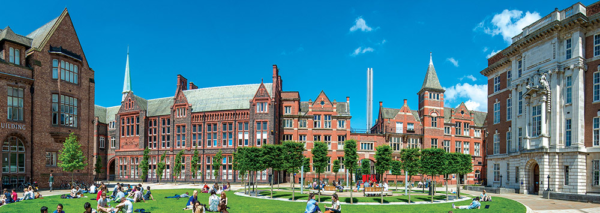
Source: University of Liverpool
Established in 1881, the University of Liverpool is one of the six ‘red brick’ universities in England and a founding member of the Russell Group (a prestigious group of 24 public research universities in the UK). The university offers research-oriented curricula to over 22,000 students out of which over 7,700 students are international students. The university is ranked 176 in the world by QS World University Ranking and 168 by Times Higher Education (THE).
Why is it good to study here?
- One of the top 200 universities in the world offering immense research options. 91% of research is deemed world leading or internationally excellent.
- Offers over 400 courses across undergraduate and postgraduate degrees.
- Has a network of 2,70,000 alumni in 171 countries.
- Considered to be a leader of the UK’s fully online postgraduate education offering 100% online programmes. This makes possible distance learning for Indian students in Liverpool.
- The university also offers global opportunities for some courses. You can choose among a year abroad, a semester abroad, a year in China, a summer abroad or clinical rotations/ placements offered in countries outside the UK.
- Departments and classrooms function on an “embedded employability” model wherein the teaching-learning process is built as a partnership among students, faculty and prospective employers. This allows students to analyse and participate in real-world experiences as part of their curricula.
- The Management School has a ‘triple crown’ accreditation from AACSB, AMBA and EQUIS.
Fees
The undergraduate tuition fee for international students range from £21,850 to £40,950 per year. Dentistry, Medicine and Veterinary Science are the most expensive programmes. Typically, the tuition fee of most programmes is around £25,000 per year. Liverpool University Fees in Indian Rupees for postgraduate programme fees are between INR 22 lakhs and 40 lakhs (£21,000 and £38,000).
Eligibility
Admission Requirements for Indian Students in Liverpool University
For undergraduate courses:
- Standard X and XII with minimum marks of approximately 70 to 85%, according to the course and exam board
- English A level grades of AAA – BBB
- 70% or above STD XII awarded by ISC, CBSE or other State Boards – English Medium as proof of English language proficiency.
For Master’s courses:
- A Bachelor’s degree from a recognised university with minimum GPA of 60%, 6.0 out of 10, 5.0 out of 8, 3.5 out of 5 or 2.7 out of 4.
- Minimum IELTS score of 6.5 with no band less than 6.0
Master’s Research (PhD)
- Masters degree with over 60%
- Minimum IELTS score of 7.0 or equivalent tests.
Courses Offered and Admission Process
The university is organised into three faculties with its constituent schools that offer over 400 courses to its students.
Faculty of Health & Life Sciences
- School of Dentistry
- School of Health Sciences
- School of Life Sciences
- School of Medicine
- School of Psychology
- School of Veterinary Science
Faculty of Humanities & Social Sciences
- School of the Arts
- School of Histories, Languages & Cultures
- School of Law & Social Justice
- Management School
Faculty of Science & Engineering
- School of Engineering
- School of Physical Sciences
- School of Electrical Engineering, Electronics and Computer Science
- School of Environmental Sciences
For undergraduate applications, you must submit through the Universities and Colleges Admissions Service (UCAS) portal. All undergraduate courses begin only in September and therefore must be applied for accordingly. Postgraduate applications can be submitted directly to the university. If your previous educational qualifications are deemed insufficient, you will be asked to take either a foundation course (for bachelor’s degrees) or a pre-master’s course before you can begin your degree at the University of Liverpool.
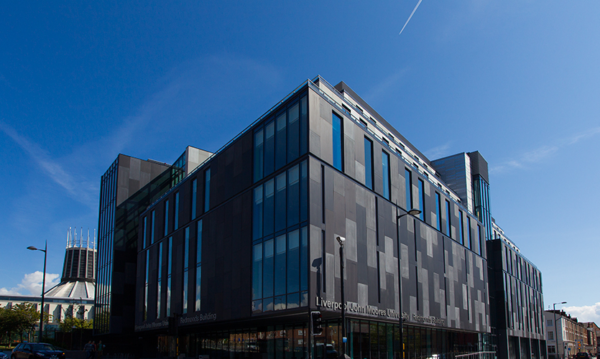
Source: LJMU
A public research university located in Liverpool, LJMU originated as Liverpool Mechanics’ School of Arts, established in 1823. From there it evolved into a polytechnic school and then grew to be the Liverpool John Moores University in 1992. The university functions in two campuses, both located in the city of Liverpool. The university is world renowned for teaching and research in Physical Education, Sport and Exercise Sciences.
Why is it good to study here?
- According to the Research Excellence Framework, over 90% of the university’s research is of international quality.
- Programmes are designed and updated to keep up with industry requirements and improve student employability.
- You have over 200 courses to choose from. There is also the flexibility of choosing between full-time and part-time modes of study for some courses.
- The university also offers a number of “Go Abroad” programmes.
- The university has also received two commendations from the Quality Assurance Agency (QAA) during its Higher Education Review. The QAA is an independent assessment body that ensures universities meet the higher education standards of the United Kingdom.
- The university also offers Degree Apprenticeships which is a work-based learning programme wherein you will spend 80% of your time at work and study part-time for the remaining 20%.
Fees
For international students, the average annual fees is between £17,750 and £18,250.
Eligibility
For Indian students applying to Undergraduate courses:
- A Higher Secondary Certificate / Standard 12 / Indian School Certificate or All India Senior School Certificate Examination with a minimum of 65% overall (60% in Maths and 60% in your chosen subject).
- A minimum IELTS score of 6.0 with no less than 5.5 in any band. The university also considers equivalent tests of English proficiency.
- If you have over 70% in English in your Class XII boards (CBSE or ISC only), you may be exempted from taking IELTS.
- A UKVI approved SELT is a compulsory requirement for students applying from the regions of Chhattisgarh, Chandigarh, Punjab, Haryana, Uttar Pradesh, Gujarat and Rajasthan, Uttarakhand, Odisha, Jammu & Kashmir, Jharkhand, Assam, Bihar, Goa, Himachal Pradesh, Madhya Pradesh, Jammu & Kashmir and North East States, irrespective of the board of your Grade XII studies.
For postgraduate programmes:
- You must have a bachelor’s degree awarded by a university that is officially recognised by Ecctis.
- You should have a minimum of IELTS 6.0 Overall with 5.5 in each component score.
Courses Offered and Admission Process
The university is divided into 5 faculties and its corresponding schools which offer hundreds of programmes to its students. You can check the entire list of programmes here.
Faculty of Arts, Professional and Social Studies
- School of Humanities and Social Science
- Liverpool School of Art and Design
- Liverpool Screen School
- School of Education
- School of Justice Studies
- International research
Faculty of Business and Law
- Liverpool Business School
- School of Law
Faculty of Engineering and Technology
- School of Computer Science and Mathematics
- School of Civil Engineering and Built Environment
- School of Engineering
- Astrophysics Research Institute
- LJMU Maritime Centre
Faculty of Health
- School of Nursing and Allied Health
- School of Psychology
- Public Health Institute
Faculty of Science
- School of Pharmacy and Biomolecular Sciences
- School of Biological and Environmental Sciences
- School of Sport and Exercise Sciences
The application for undergraduate study is submitted through UCAS. You will be evaluated based on your application form (that includes your previous academic transcripts, a personal essay and letters of recommendation) for most programmes. However, some courses might require you to interview, audition, take a short assessment test or present a portfolio of work. Once an offer has been made, you will be invited to a faculty based open day, an interview or an audition.
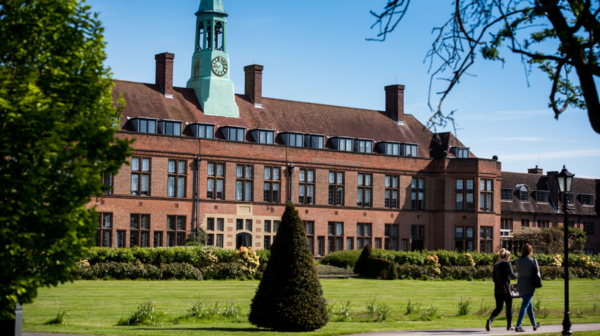
Source: LHU
A public university with two teaching campuses in Liverpool, LHU grew out of three teacher training colleges in the British Isles. The university is ranked 3rd in the North West and joint 27th in the UK for student satisfaction, in The Complete University Guide 2024.
Why is it good to study here?
- Liverpool Hope was ranked Gold in the Teaching Excellence Framework, instituted by the UK Government.
- Liverpool Hope University has over 50 strategic partnerships with universities across the globe, opening up a world of opportunities. This also includes Christ University in Bangalore and Stella Maris College in Chennai, bringing the quality of one of the best Liverpool Universities in India. It also opens up opportunities for distance Learning for Indian Students in Liverpool.
- The university offers all students the opportunity to add a placement year to their degree.
Fees
Tuition fees for international students for 2024-25 are as follows:
- Undergraduate degrees: £13,000 per year;
- Postgraduate taught courses: £13,000
- MRES: £13,000
- International MBA: £15,000
Eligibility
To study in Liverpool from India, the following qualifications are required. Note that these are minimum requirements and do not guarantee admission. You must also look into the specific eligibility criteria of your course.
- Undergraduate (Bachelors, BA, BSc) – Standard XII with 75 – 85% in all subjects
- Postgraduate – A relevant undergraduate degree from a recognised university
- IELTS requirement of 6.0 for bachelor’s degrees or 6.5 for master’s degrees or any of the equivalent tests.
Courses Offered and Admission Process
The university is divided into ten departments which offer a wide variety of courses.
- Liverpool Hope Business School
- School of Creative and Performing Arts
- School of Education
- Department of Geography and Environmental Science
- School of Health and Sport Sciences
- School of Humanities
- School of Law and Criminology
- School of Mathematics, Computer Science and Engineering
- Department of Psychology
- School of Social Sciences
All undergraduate study applications go to the university through UCAS. You can apply for postgraduate taught courses directly through the university website. For October entry, applications close in Mid-July for postgraduate courses.

Source: LSTM
The first institution in the world dedicated to the research and teaching in the field of tropical medicine, the Liverpool School of Tropical Medicine was established in 1898. At the time, Liverpool was a prominent port city with extensive connections to various parts of the tropical world. Hence, there was a need for this dedicated school that has continued till today. The school has over 600 students from 60+ countries and offers Master’s, PhD research and a range of professional programmes.
Why is it good to study here?
- The LSTM has research funding of over £200 million.
- For those interested in research in the field of infectious diseases, this school is a dedicated place of study.
- The nature and calibre of this institution’s research has resulted in over 10 international consortia and product development partnerships aimed at reducing or eliminating the impact of diseases upon the world’s poorest people.
- This school is primarily associated with the Tropical Infectious Disease Unit (TIDU) of the Liverpool University Hospital NHS Foundation Trust (LUHFT).
Fees
The fees for international students is typically £23,000 – £24,000 for a one-year course. However, for students applying from Low- and Middle-Income Countries (including India), the fees is around £12,500. It is a part of the school’s The 125th Anniversary Excellence Scholarship scheme.
Eligibility
Master’s programmes are open to health professionals, graduates in health or other related disciplines. Medical students who have completed at least three years of study and wish to intercalate are also accepted onto the programme. For a doctoral research programme, a relevant master’s degree is required. A minimum IELTS score of 6.5 is needed.
Courses Offered and Admission Process
The LSTM offers only Master’s, Doctoral and Professional programmes. You can access the entire list here.
To apply, you must register for a MyLTSM account. By registering, you will be able to apply for courses, upload supporting documentation, save your draft application, accept an offer to study and keep your account information up to date.
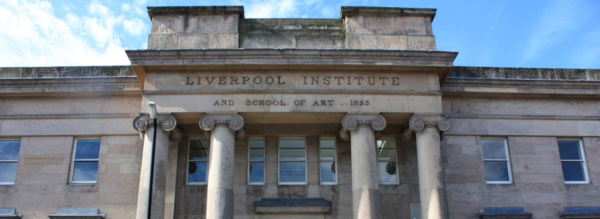
Source: LIPA
Founded in 1996 by Paul McCartney of the Beatles and Mark Featherstone-Witty, the LIPA offers undergraduate and postgraduate courses exclusively in the field of performing arts, whether you are interested in the performing or the management aspects of the stage.
Why is it good to study here?
- This institute covers a range of performing arts from acting and music to the backend and management such as management, production and sound technology.
- Offers a creative and inspiring ethos for those wishing to push the boundaries of performance.
- Offers first-class facilities for its students and invests around £5,00,000 each year to update and upgrade.
- Works in coordination with notable industry figures each year to deliver masterclasses.
- Liverpool is one of the cultural capitals of the UK and Europe as a whole.
Fees
For overseas students, the tuition fee is around £19,500 per year, of which 25% should be paid as a deposit at the beginning of the year.
Eligibility
The primary selection criteria is the audition/ interview which is conducted either in-person or online.
For undergraduate courses, you must have completed Grade XII.
A recognised bachelor’s degree in a relevant field and professional experience is required for a master’s programme.
A minimum IELTS requirement of 5.5-6.5 is required.
Courses Offered and Admission Process
The following courses are offered:
- BA (Hons) Acting (Musical Theatre)
- BA (Hons) Acting (Musicianship)
- BA (Hons) Acting
- BA (Hons) Acting (Screen & Digital)
- BA (Hons) Applied Theatre and Community Drama
- BA (Hons) Dance
- BA (Hons) Filmmaking & Creative Technologies
- BA (Hons) Management for the Creative Industries and Performing Arts
- BA (Hons) Music (Popular, Contemporary & Commercial)
- BA (Hons) Music (Songwriting & Performance)
- BA (Hons) Music (Songwriting & Production)
- BA (Hons) Sound Technology
- BA (Hons) Theatre & Performance Design
- BA (Hons) Theatre and Production Technology
- BA (Hons) Music (Contemporary Pop Voice & Performance)
- BA (Hons) Music (Session Musicianship)
- BA (Hons) Music (Production)
- MA Acting
- MA Professional Practice: Theatre and Drama Facilitation
- MA Costume Making
- MA Music Industry Management
A majority of the auditions and interviews are scheduled in February/ March. So your applications must be timed accordingly. Undergraduate applications go through UCAS while master’s applications are through the institute’s portal. As mentioned earlier, significant weightage is placed on your interview/ audition.
While these are the main degree granting institutions in Liverpool, let us also look at the top colleges from where you can gain vocational training or supplement your university degree.
Rather than higher education, the City of Liverpool College is an institution established in 1992 to further education in England. Over the years, it has grown to accept international applications as well. The focus is on vocational, academic, and young and adult training. They provide university pathways for in various areas of study and professional and trade courses for you to join the workforce. Some of its popular trade courses include plastering, hairdressing, electrical installation and motor vehicle engineering.
With its history going back to 1891, Hugh Baird College is located in Merseyside, England. An institution primarily focussed on vocational and technical training, it provides courses from apprenticeships, to T-levels, A-levels, university level courses and adult learning, with dedicated campuses and employment-focused results. It is an Indian equivalent of an ITI. However, it currently does not accept applications from international students.
Now that you have the list of Liverpool universities, how do you go about the application process? Each university/ course has its own set of requirements and deadlines to keep up with. The prep work can get overwhelming. You also have to choose if you want to go the research way or take the clinical path. Here is how you can make the process simpler.

Step 1
Go to tcglobal.com and sign in. It opens the world of universities for you, for free. All you have to do is sign up. We simplify international education, learning, and mobility through connecting students, universities, and a global community on a single platform where there are over 1000+ education providers and over 80,000+ courses.

Our platform enables students to study anywhere in the world in just a few steps. From search and discovery and finding the right course fit for you, to applications, student visas and departure – we see you through it all.
Step 2
Complete your profile. Ensure you have everything filled up especially about your existing qualifications, choice of courses and your top preferences of colleges in Liverpool. If you have worked in a related field, do let us know. This will help us collate the best universities for you.
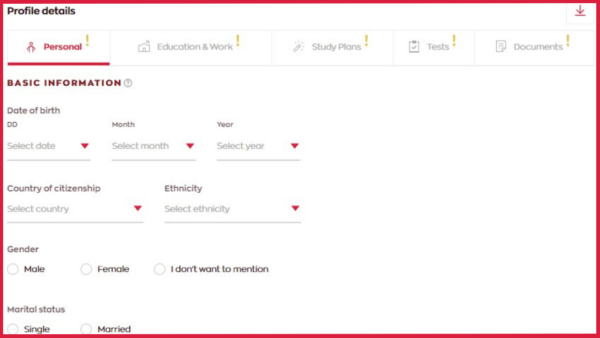
Step 3
Search for the courses of your choice. All the information you need, gathered in one place, at no cost.
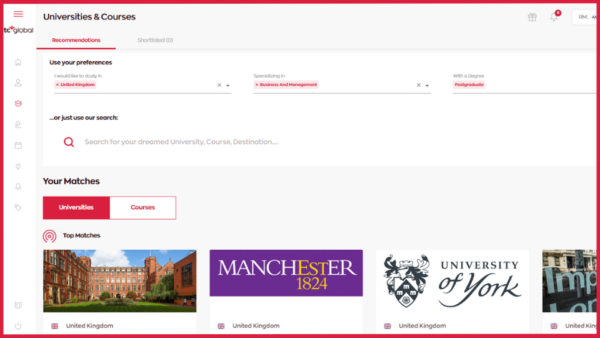
Step 4
Check out our insights page for more up-to-date information about universities and colleges.
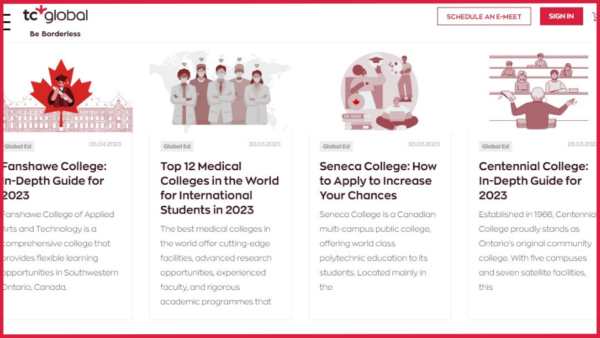
Step 5
Then simply set up a visit Calendly.com/tcglobal to pick a Relationships Team closest to you and choose a slot to meet with a Relationship Member. Our RM will be with you every step of the way, helping you identify the perfect course and university in Liverpool, assisting you in the admission process all the way till immigration.
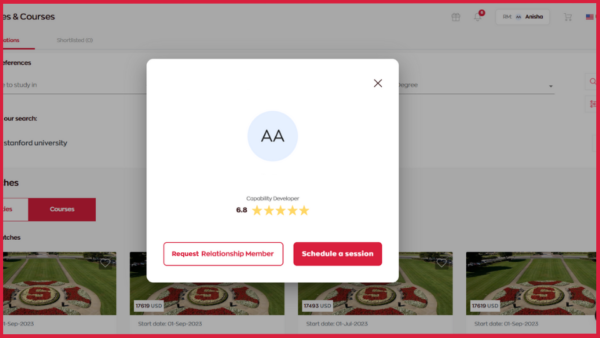
Let’s shape your future together.
You May Also Like:
